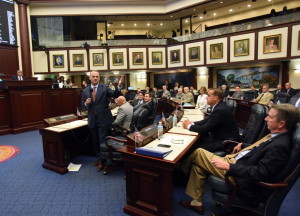
State Rep. Richard Corcoran, R-Lutz, speaks on the House floor during a June special session. Photo via Florida House.
The incoming speaker of Florida's House of Representatives laid down a marker on Wednesday, signaling plans to push for broader school choice.
Rep. Richard Corcoran, R-Lutz, was officially chosen by his colleagues to lead the chamber after next year's elections. During his designation ceremony, he said the education system has systematically short-changed poor and minority families.
"We need to fully fund the right of every parent to make the decision that they know best — what learning environment is best for their child," he said. "That's how we open up the doors to a brilliant future for every student in this state."
Corcoran didn't lay out specifically what his proposal would look like. His prepared remarks, as reported by the Tampa Bay Times' Buzz blog, suggest he supports multiple options, public and private, but his speech was more about laying out principles than delving into details.
Corcoran himself is a home-school father, and his wife helped start a charter school in Pasco County.
"A decades-long, one-size-fits-all school system promulgated by bureaucrats has failed to deliver on the promise of opportunity for all," he said in his speech. "Separate-but-unequal may no longer be the law, but it's all too often the reality. A world-class education should not be only within the reach of rich people."
Afterward, reporters pressed Corcoran on the implications of his remarks (see around 6:55 of this video).
In 1999, Florida passed its first school voucher program, which the state Supreme Court found unconstitutional in 2006. In 2001, the state created a tax credit scholarship program, which the statewide teachers union and other groups sued to stop last year.* Courts have also blocked attempts to create a statewide charter school authorizer.
Corcoran told reporters he disagreed with past court rulings that held the state constitution can restrict school choice, and said he would be undeterred by the prospect of a lawsuit.
"Listen, half the stuff that we do nowadays that's controversial is litigated by some group, entity or whatever, but it doesn't mean that we should stop moving (toward) something that we know will transform people's lives in our state," he said. "We're going to go down that path with the firm belief that it's constitutional."
*The author of this post works for Step Up For Students, which helps administer the tax credit scholarships.